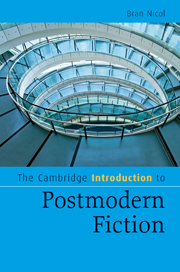Book contents
- Frontmatter
- Contents
- Acknowledgements
- Preface: reading postmodern fiction
- Introduction: postmodernism and postmodernity
- Chapter 1 Postmodern fiction: theory and practice
- Chapter 2 Early postmodern fiction: Beckett, Borges, and Burroughs
- Chapter 3 US metafiction: Coover, Barth, Nabokov, Vonnegut, Pynchon
- Chapter 4 The postmodern historical novel: Fowles, Barnes, Swift
- Chapter 5 Postmodern-postcolonial fiction
- Chapter 6 Postmodern fiction by women: Carter, Atwood, Acker
- Chapter 7 Two postmodern genres: cyberpunk and ‘metaphysical’ detective fiction
- Chapter 8 Fiction of the ‘postmodern condition’: Ballard, DeLillo, Ellis
- References
- Index
- Cambridge Introduction to …
Chapter 7 - Two postmodern genres: cyberpunk and ‘metaphysical’ detective fiction
Published online by Cambridge University Press: 05 June 2012
- Frontmatter
- Contents
- Acknowledgements
- Preface: reading postmodern fiction
- Introduction: postmodernism and postmodernity
- Chapter 1 Postmodern fiction: theory and practice
- Chapter 2 Early postmodern fiction: Beckett, Borges, and Burroughs
- Chapter 3 US metafiction: Coover, Barth, Nabokov, Vonnegut, Pynchon
- Chapter 4 The postmodern historical novel: Fowles, Barnes, Swift
- Chapter 5 Postmodern-postcolonial fiction
- Chapter 6 Postmodern fiction by women: Carter, Atwood, Acker
- Chapter 7 Two postmodern genres: cyberpunk and ‘metaphysical’ detective fiction
- Chapter 8 Fiction of the ‘postmodern condition’: Ballard, DeLillo, Ellis
- References
- Index
- Cambridge Introduction to …
Summary
Despite its near-definitive tendency to problematize or collapse generic boundaries (demonstrated in many of the readings in this book) postmodern fiction, like any current within literary history, has inevitably favoured some genres over others, though not of course using them ‘straight’, but adapting and subverting them. This chapter assesses the way that postmodern literary fiction co-opts two popular narrative genres – science fiction and detective fiction – and the implications of this for understanding how postmodern fiction works.
Sci-fi and cyberpunk
Science fiction, and its potential to offer an alternative to realism – and a critique of it – has proved central to postmodernism. We have noted this already with regard to writers such as Burroughs, Vonnegut, Atwood, and Acker, each of whom draws on sci-fi in their work.
The reason for this is explained by Brian McHale, the theorist who has made the most valuable contribution to the study of the relationship between postmodernism and science fiction, and its subgenre cyberpunk. We recall that science fiction plays a key role in his poetics of postmodernism, as ‘it is the ontological genre par excellence (as the detective story is the epistemological genre par excellence), and so serves as a source of materials and models for postmodernist writers’ (McHale, 1987, 16). This is because both postmodernism and sci-fi make use of ‘the universal fictional resource of presentation of virtual space’. Of course, as we considered in Chapter 1, ‘projecting virtual space’ is a definitive characteristic of all fiction.
- Type
- Chapter
- Information
- The Cambridge Introduction to Postmodern Fiction , pp. 164 - 183Publisher: Cambridge University PressPrint publication year: 2009



